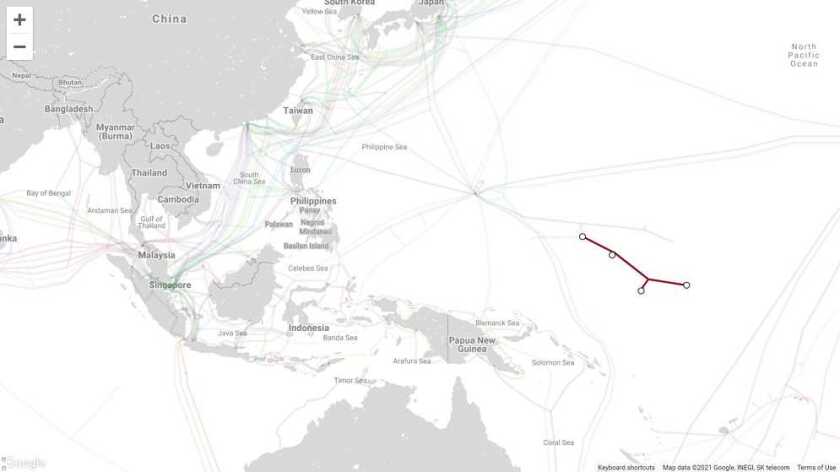According to Reuters, the 2,000km system connecting the Pacific islands of Kiribati, Micronesia and Nauru, before interconnecting with the existing HANTRU1 Cable System, stalled in its negotiations to award a subsea cable supplier, after the Pacific island governments took note of the warnings from the US, that participation of a Chinese company posed a potential security threat.
The company in question, HMN Technologies (formerly Huawei Marine) is said to have submitted its project bid at more than 20% lower than Alcatel Submarine Networks (ASN) and Japan’s NEC, also bidding for the contract. This in tandem with the agreeable terms put forward by HMN, according to source, presumably made HMN favourites to win the contract.
According to sources, it is The East Micronesia Cable’s onward connectivity via the HANTRU1 Cable System to Guam, a US territory home to a number of military assets, that has heightened the risk factor.
"Given there was no tangible way to remove Huawei as one of the bidders, all three bids were deemed non-compliant," one source told Reuters.
In statement, The World Bank said, “"The process has concluded without an award due to non-responsiveness to the requirements of the bidding documents."
All these concerns are as a result of the long standing fears held by the US that Chinese technology firms are required to co-operate with Beijing’s intelligence and security services, a claim that has been repeated denied.
Starting with the Department of Commerce’s ban of ZTE back in 2017-18, May 2019 saw Huawei, on the grounds of security, added to the Depart of Commerce’s entity list. Since then members of the US House of Representatives said it would take steps to subsidising rural operators to replace Huawei and ZTE equipment in their networks. Most recently, President Joe Biden reinforced this stance with a ban on investing in any of 59 Chinese companies from 2 August onwards.
In response, to Reuters, a Chinese foreign ministry spokesperson said that all such negotiations should operate within a non-discriminatory business environment, adding that, “As a matter of principle, I want to emphasise that Chinese companies have always maintained an excellent record in cyber security,” they said.
“The Chinese government has always encouraged Chinese companies to engage in foreign investment and cooperation according to market principles, international regulations and local laws."
The news comes as the similarly controversial Pacific Light Cable Network (PLCN) cable connecting the Philippines, the US and Taiwan, was confirmed to still be progressing.
Confirmed by Kevin Salvadori, vice president of network investments at Facebook, "We are working with partners and regulators to meet all of the concerns that people have, and we look forward to that cable being a valuable, productive transpacific cable going forward in the near future."
In June 2020, Team Telecom – the telecoms security group set up in Washington in April by an executive order from President Donald Trump – recommended that the last leg of the PLCN not be allowed to go into operation due to the cable’s connections to Hong Kong and Huawei.





